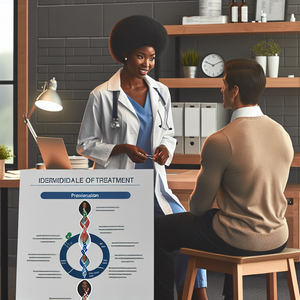The Future of Healthcare: TSP’s Commitment to Innovation

Emerging technologies are at the forefront of TSP's strategy to enhance efficiency and accuracy in clinical trials. One of the most transformative technologies being embraced is artificial intelligence (AI). TSP utilizes AI algorithms to sift through vast datasets, enabling the identification of patterns that can expedite drug development processes. For instance, predictive analytics powered by AI helps TSP anticipate potential roadblocks in clinical trials, allowing for proactive adjustments that enhance study outcomes. This shift towards data-driven decision-making not only accelerates the research timeline but also improves the reliability of the findings. In addition to AI, TSP is harnessing the power of blockchain technology to ensure the integrity and security of clinical trial data. Blockchain’s decentralized nature allows for secure data sharing among stakeholders while maintaining transparency and trust. This is particularly critical in clinical research, where data accuracy is paramount. TSP's integration of these emerging technologies sets a new standard for operational excellence and enhances patient care by ensuring that data is both reliable and accessible.
Innovative Research Methodologies
Beyond technological advancements, TSP is pioneering innovative research methodologies that reflect the current healthcare landscape's needs. Traditional clinical trials often face criticism due to their lengthy and cumbersome nature. TSP is addressing this challenge by implementing decentralized clinical trials (DCTs). DCTs facilitate patient participation from their homes, significantly increasing enrollment rates and diversifying the patient population. This model not only improves the quality of data collected but aligns with the growing emphasis on patient-centric care—an essential principle in modern healthcare. Moreover, TSP is leveraging real-world evidence (RWE) to enrich its research framework. Analyzing data collected outside traditional clinical trial settings allows TSP to gain deeper insights into treatment efficacy in everyday life. This approach enhances the relevance of research findings, ensuring they are applicable to real-world scenarios and ultimately improving patient outcomes.
Commitment to Sustainability
In response to increasing pressure for sustainable practices in healthcare, TSP is positioning itself as a leader in environmental responsibility. Recognizing the significant impact of clinical research on the environment, TSP has initiated several sustainability efforts aimed at reducing its carbon footprint. For example, by embracing virtual collaboration platforms, TSP has minimized the need for travel, thereby reducing greenhouse gas emissions. This not only contributes to environmental conservation but also aligns with the values of a growing demographic of eco-conscious clients and patients. Additionally, TSP is exploring sustainable sourcing practices in its supply chains, ensuring that its operations are environmentally friendly. By implementing these initiatives, TSP demonstrates that it is possible to balance operational efficiency with ecological responsibility, setting a precedent for other organizations in the industry.
TSP’s unwavering commitment to innovation places it at the forefront of shaping the future of healthcare. By embracing emerging technologies, implementing innovative research methodologies, and prioritizing sustainability, TSP is enhancing its operational capabilities while meeting the evolving needs of the healthcare landscape. As TSP continues to push boundaries and set new standards, it exemplifies how organizations can thrive while making a positive impact on both the industry and the environment. With trailblazers like TSP leading the way, the future of healthcare is indeed bright, promising ongoing advancements that will ultimately improve patient outcomes and redefine the clinical research paradigm.
Clinical Research Associate (CRA)
Pharmaceutical companies, CROs (Contract Research Organizations), and academic research institutions
Core Responsibilities
Monitor and manage clinical trial sites to ensure adherence to protocols and regulatory compliance.
Conduct site visits to evaluate data integrity and participant safety, providing training and support to site staff.
Collaborate with cross-functional teams to address challenges and optimize trial performance.
Required Skills
Strong understanding of Good Clinical Practice (GCP) and regulatory guidelines.
Excellent communication and interpersonal skills to liaise with investigators and site staff.
Ability to analyze data and maintain meticulous documentation.
Data Scientist in Healthcare
Biotech firms, healthcare technology companies, and research institutions
Core Responsibilities
Analyze large datasets to identify trends and patterns relevant to clinical trials and patient outcomes.
Develop predictive models using machine learning algorithms to enhance trial efficiency and data accuracy.
Collaborate with clinical teams to provide actionable insights that inform study design and operational strategies.
Required Skills
Proficiency in programming languages such as Python or R, and experience with data visualization tools.
Strong statistical analysis skills and familiarity with healthcare datasets.
Knowledge of machine learning techniques and their application in clinical research.
Project Manager in Clinical Research
CROs, pharmaceutical companies, and healthcare research organizations
Core Responsibilities
Lead cross-functional teams in the planning and execution of clinical trials, ensuring timelines and budgets are met.
Facilitate communication among stakeholders, including sponsors, investigators, and regulatory bodies.
Monitor project progress, identify risks, and implement mitigation strategies to maintain project integrity.
Required Skills
Strong organizational and leadership abilities, with a focus on project management methodologies (e.g., Agile, Waterfall).
Excellent problem-solving skills and the ability to adapt to changing project dynamics.
Familiarity with clinical trial management systems (CTMS) and budgeting processes.
Regulatory Affairs Specialist
Pharmaceutical companies, biotechs, and regulatory consulting firms
Core Responsibilities
Prepare and submit regulatory documents to obtain necessary approvals for clinical trials and new drug applications.
Advise project teams on regulatory requirements and ensure compliance throughout the trial lifecycle.
Monitor changes in regulations and assess their impact on ongoing and future studies.
Required Skills
In-depth knowledge of FDA regulations and international guidelines (e.g., ICH GCP).
Strong written and verbal communication skills for effective documentation and presentation.
Detail-oriented with strong analytical skills to assess regulatory risks and requirements.
Patient Recruitment Specialist
Clinical research organizations, pharmaceutical companies, and patient advocacy groups
Core Responsibilities
Develop and implement strategies to enhance patient engagement and recruitment for clinical trials.
Collaborate with community organizations and healthcare providers to raise awareness and interest in clinical studies.
Track recruitment metrics and adjust strategies based on data-driven insights to optimize enrollment.
Required Skills
Strong interpersonal skills for building relationships with patients and healthcare professionals.
Experience in marketing or outreach programs, particularly within the healthcare sector.
Knowledge of demographics and cultural sensitivities to effectively reach diverse patient populations.


